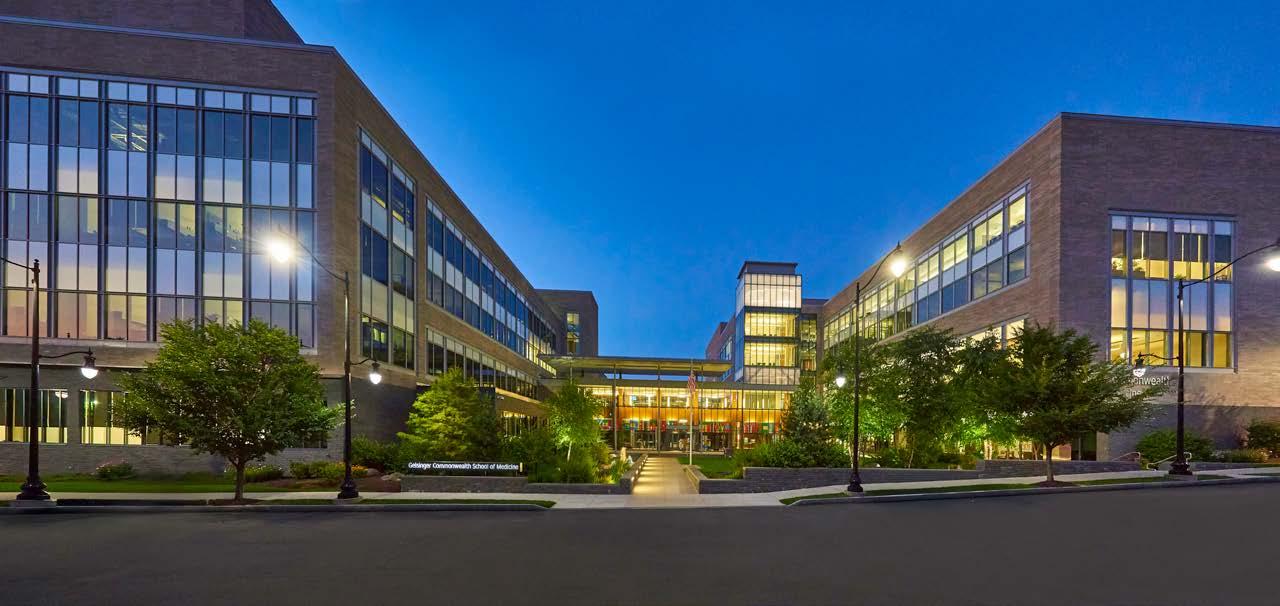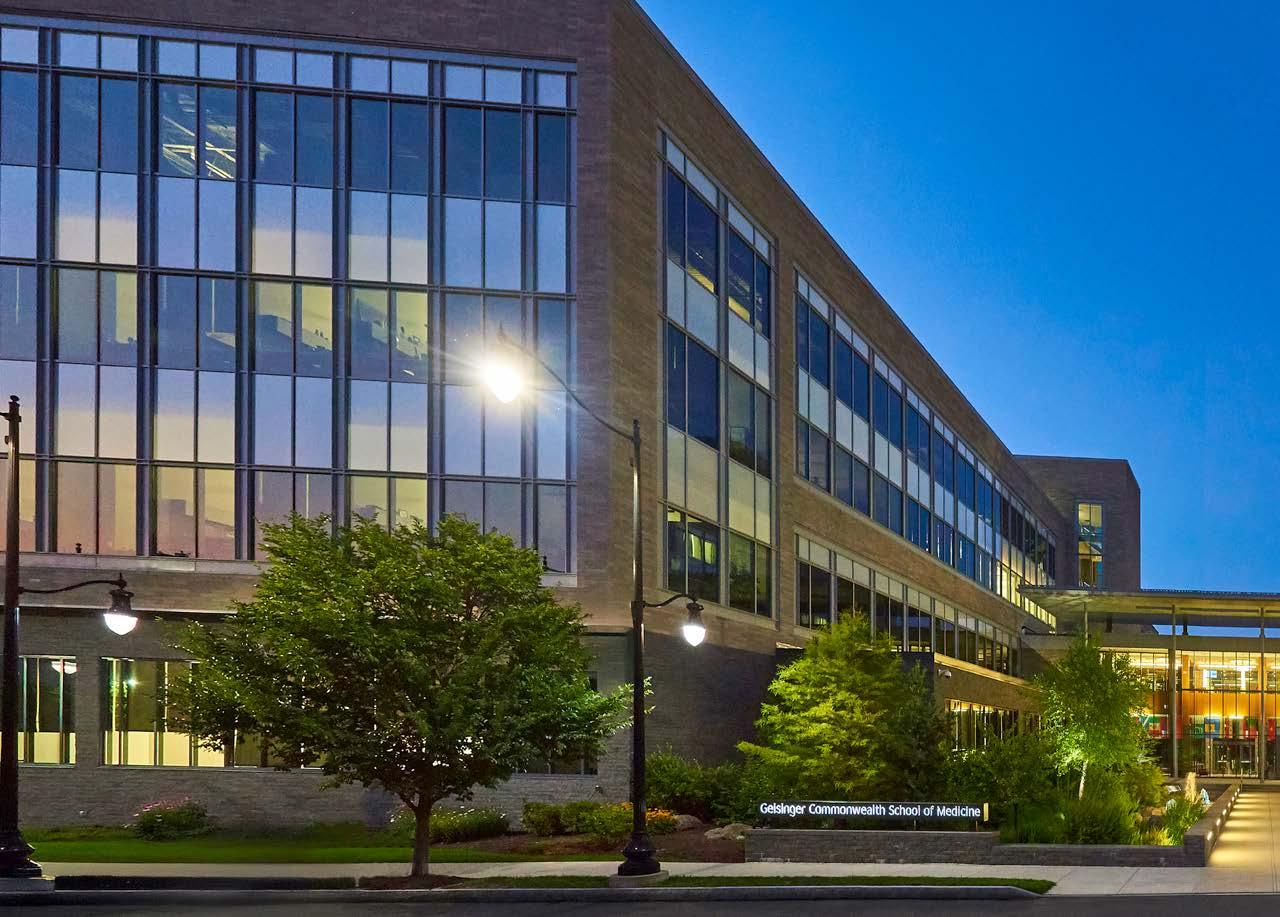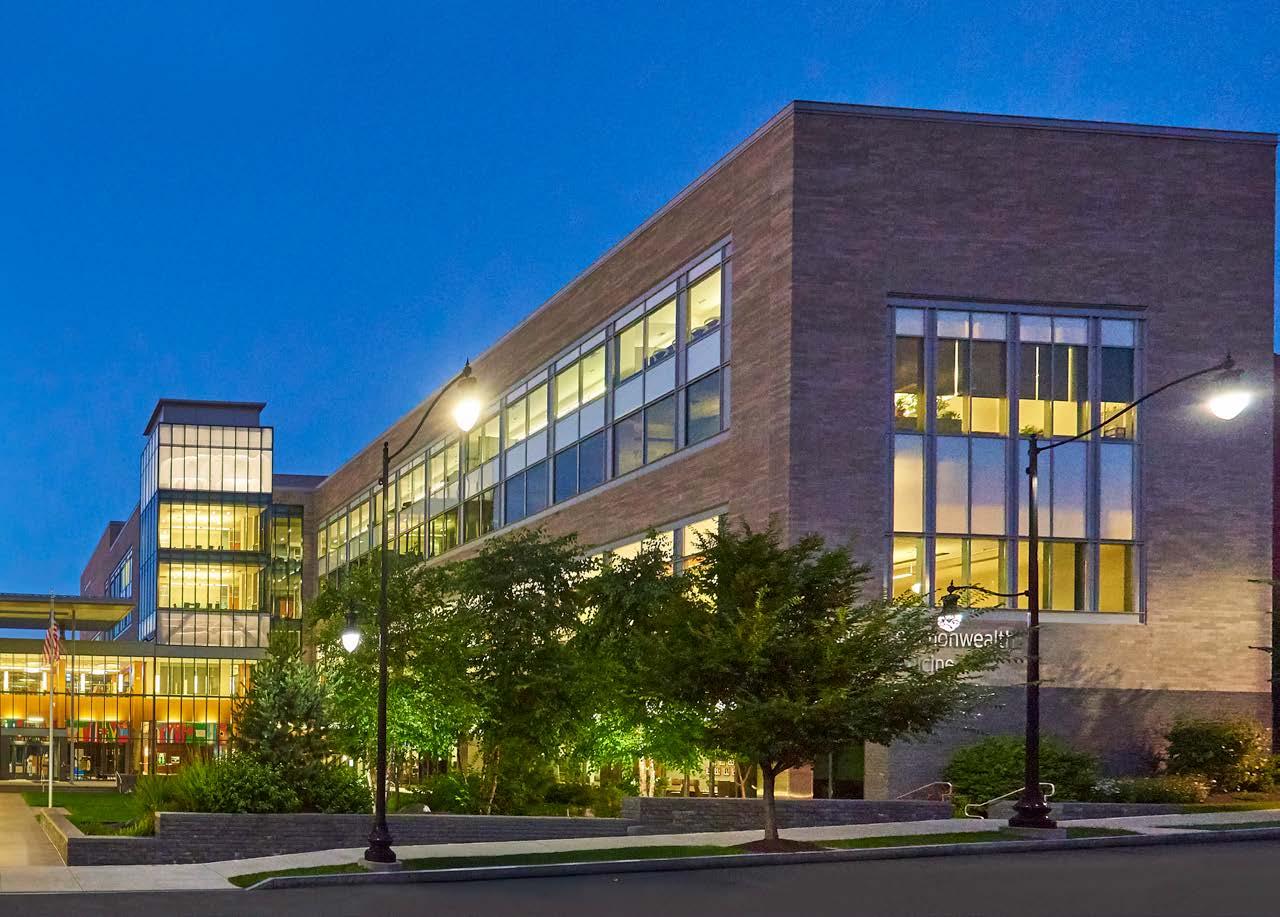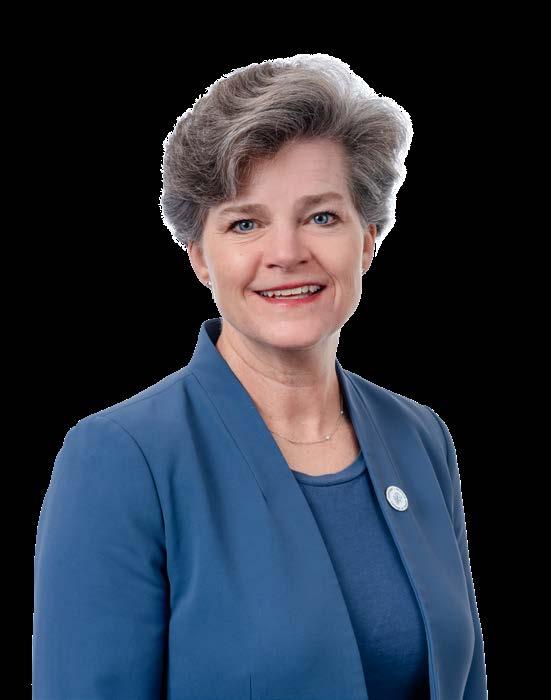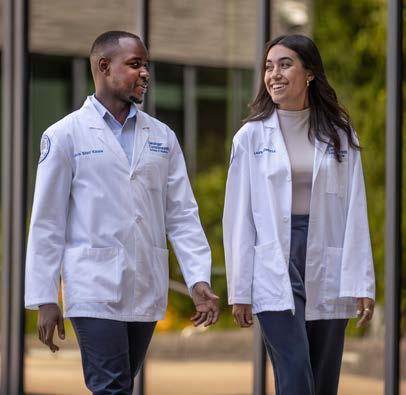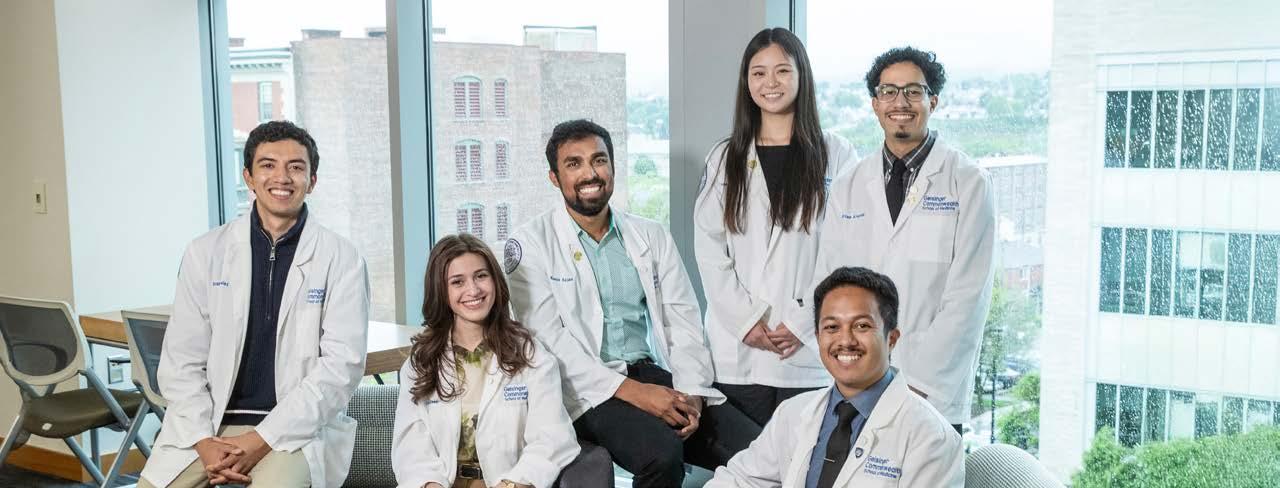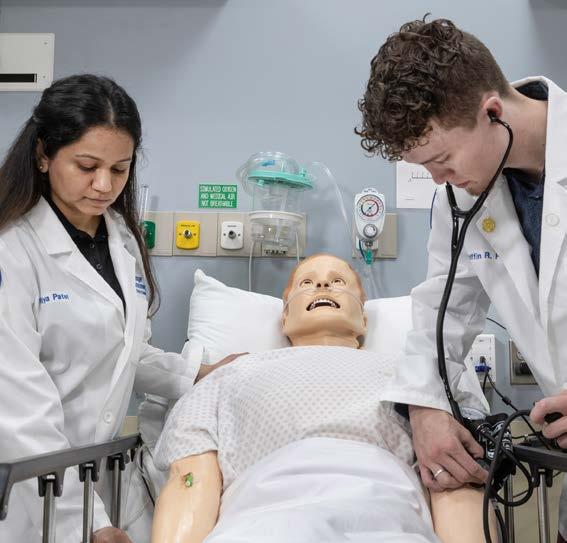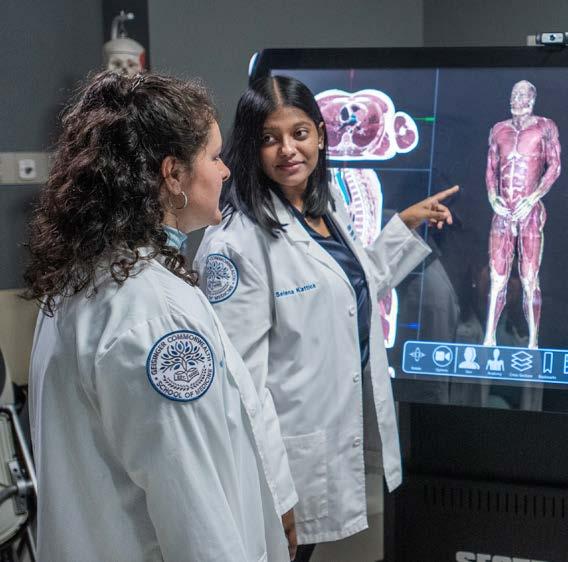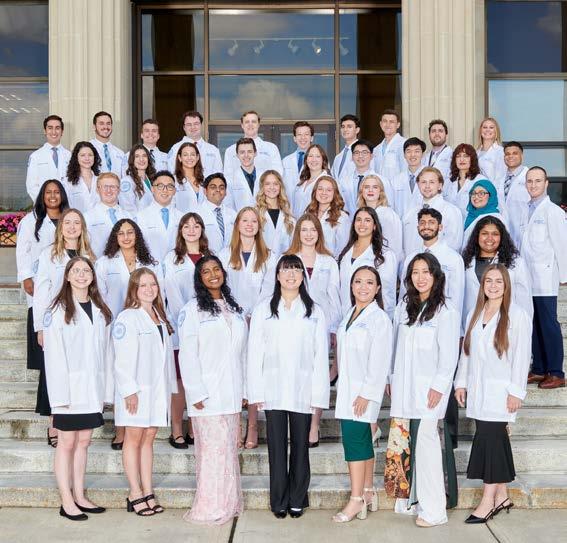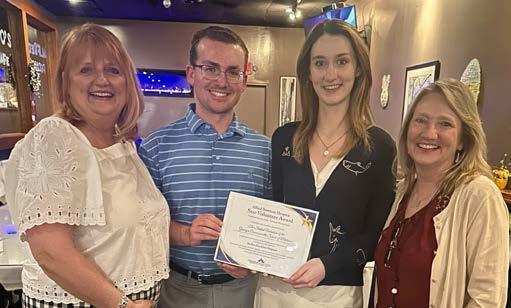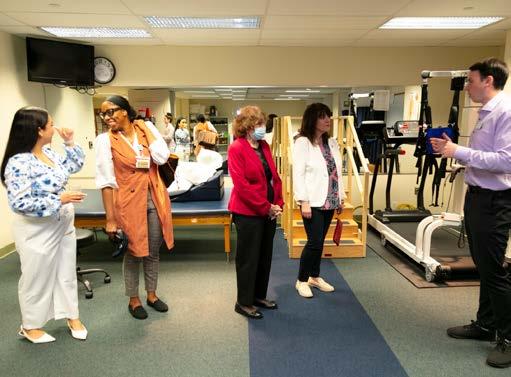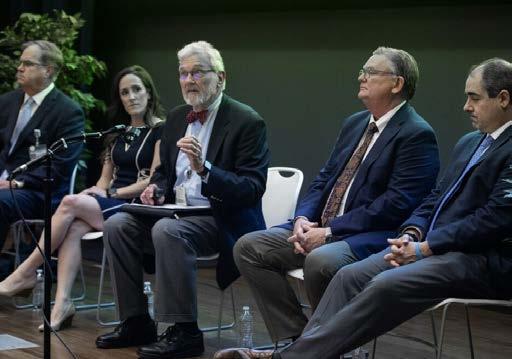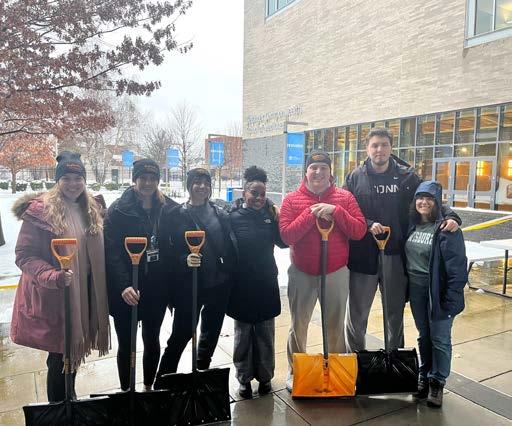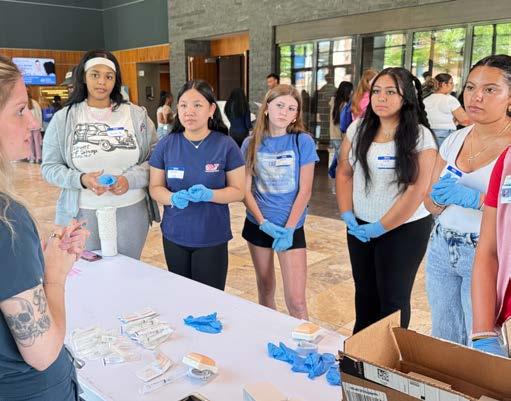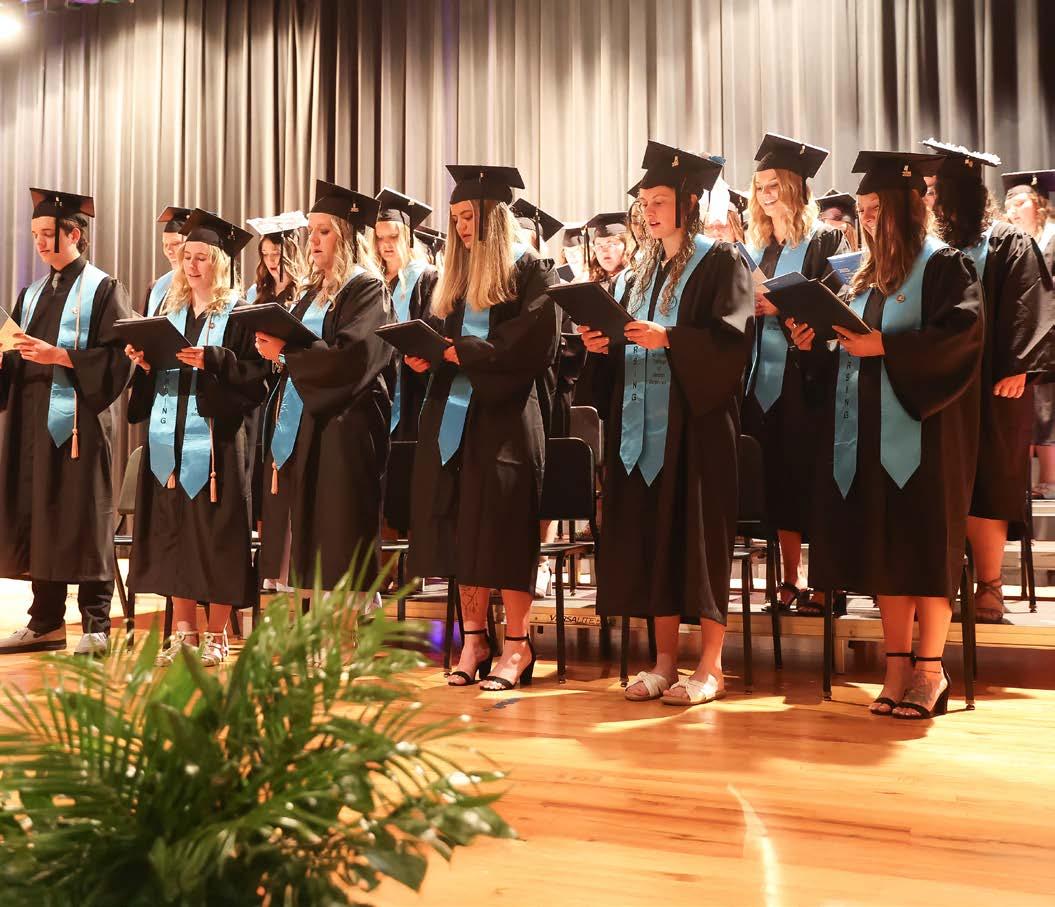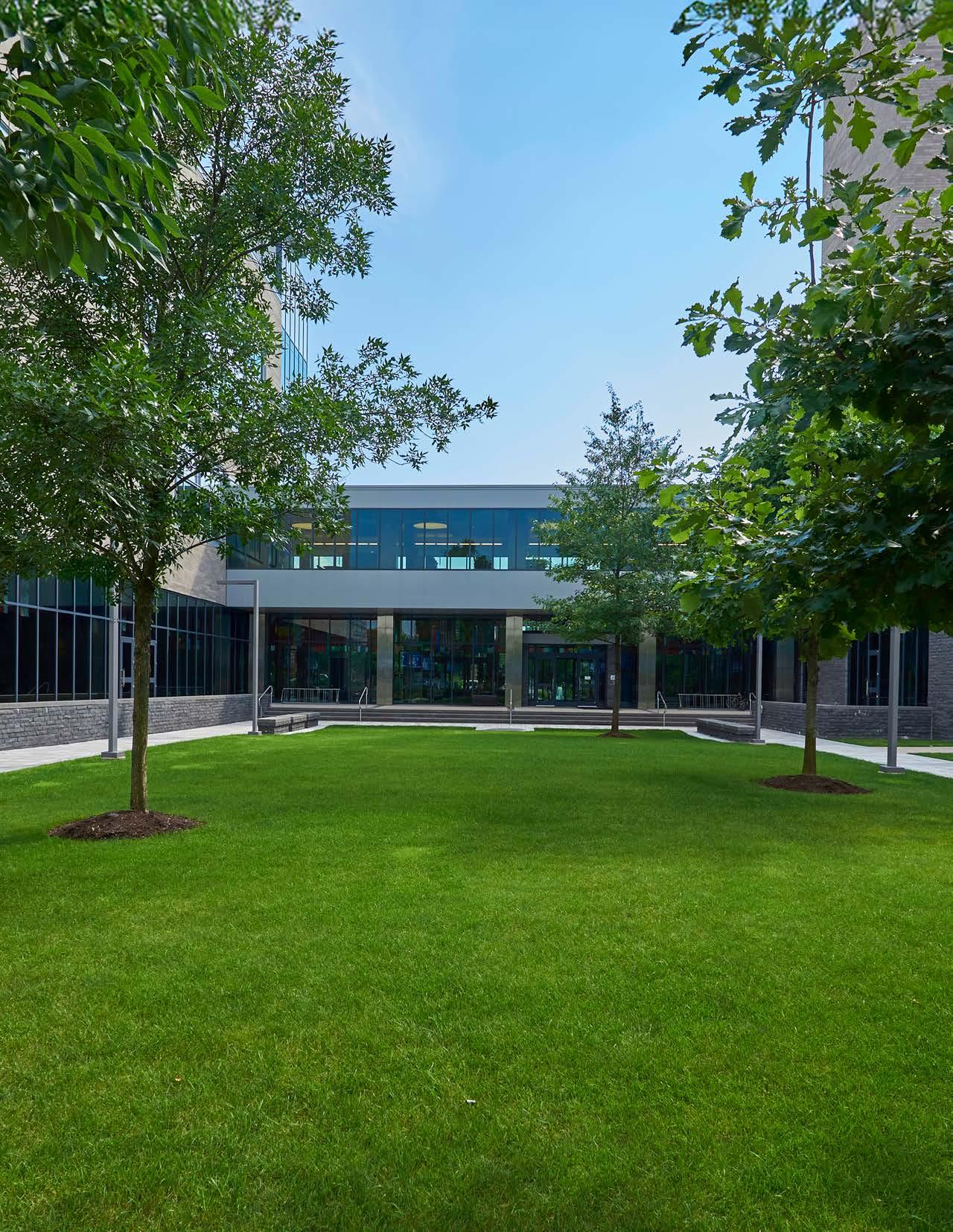SCHOOL OF MEDICINE
Geisinger College of Health Sciences advances health through exceptional education, research and community engagement. We educate and support compassionate healthcare professionals and scholars dedicated to excellence, discovery and innovation. Our graduates are prepared to improve the quality and value of healthcare, advance equity, address the unique attributes of our region and its people, and promote
all.
Geisinger Commonwealth School of Medicine educates aspiring physicians and scientists to serve society using a community-based, patient-centered, interprofessional and evidence-based model of education that is committed to inclusion, promotes discovery and utilizes innovative techniques.
Message from the president and dean
When our medical school was launched in 2008, it had a singular mission: to benefit its surrounding communities. We envisioned those benefits would come in at least three ways.
First, we would train doctors to serve our region.
Second, we would inspire the young people of our communities to pursue careers in the health professions and give them access to that education in their own hometown.
Third, our scholarly and clinical activities would fuel the region’s economic engine, resulting in direct, indirect and induced economic growth.
We have achieved our vision in what we like to call our “uniquely Geisinger” way.
We are tackling the physician shortage and the desire to uplift local talent with commonsense solutions. We recognized that the cost of medical school often forces young people to make painful decisions about where and which specialty to practice. Our Abigail Geisinger Scholars Program (and a related program in nursing) provides funding support for a choice so many students long to make — to practice primary care right in their own hometowns.
Our research focuses on novel ways to prevent disease and promote health, by studying the health conditions that most impact our patients and communities. That research includes the emerging field of decision science, which seeks to understand how doctors can better connect and inspire their patients. It also includes MyCode, the biobank that empowers precision medicine.
In these pages you’ll see the economic impact we have made in our region. Our promise is to never stop getting better at being better and never stop helping our communities thrive.
Julie Byerley, MD, MPH President, Geisinger College of Health Sciences Dean, Geisinger Commonwealth School of Medicine Executive Vice President and Chief Academic Officer, Geisinger
Economic impact study – May 2025
Study produced by The Institute for Public Policy & Economic Development.
Overall
Overall
SCHOOL OF MEDICINE
Regional campuses
Annual impact in Pennsylvania
The annual impact of the School of Medicine in Pennsylvania exceeds $71.5 million, with over $27.9 million attributed to indirect or induced effects, which support other businesses and industries in the region. The School of Medicine supports about 403 jobs each year in Pennsylvania, including more than 167 jobs across various industries and enterprises. While the School of Medicine does not directly pay income tax, the economic activities generate direct and indirect tax accruals. The School of Medicine generates over $12.3 million in tax revenue annually in Pennsylvania, with more than $1.4 million remaining at the local level. Because of our branch campuses, the School of Medicine also impacts New Jersey and New York. This report focuses on financial impacts while healthcare impacts are even greater.
Operations
The school employs 238 people across its operations, with the largest facility located in northeastern Pennsylvania. The school spends about $28,664,000 on annual wages and benefits, alongside $16,850,000 in operating expenses
Construction: One-time impact
The School of Medicine, which was built in 2011, completed a construction project on its Scranton campus in 2025. It generated nearly $578,000 in economic output and over $73,000 in tax impact while supporting 16 jobs in construction, wholesale, retail and restaurants.
Student spending
In 2024–2025, 225 students had relocated to the area to attend school, and 293 reside in the City of Scranton. Annual student spending creates nearly $2.8 million in economic output each year and supports 17 jobs in other sectors, including food, housing, entertainment and clothing, while generating about $400,000 in tax impact.
Alumni
Since its inception through 2024, the School of Medicine has graduated 1,076 medical students, including 602 residents/fellows and 474 physicians.
As of May 2025, about 50 past graduates practice medicine or train in northeastern Pennsylvania, and this number is growing. Their annual economic
output exceeds $9.4 million, and their tax impact surpasses $1.4 million. Their yearly spending supports nearly 58 jobs across various sectors, including daycares, social organizations, schools, hospitals, retailers, housing and restaurants.
About 120 graduates practice medicine in Pennsylvania. These graduates support the regional healthcare infrastructure in their communities, adding immeasurable benefits to quality of life, generating annual economic output and tax benefits, and supporting jobs in other sectors. Their annual economic output exceeds $37.3 million, and their tax impact is nearly $5.4 million. Their yearly spending supports almost 200 jobs across various sectors. Their annual spending benefits daycares, social organizations, schools, hospitals, retailers, housing, restaurants and all industries where households spend their wages.
Community impact
Student community immersion
Service has always been integral to a Geisinger education. Since our founding, our medical students have gone into neighborhoods and homes to learn about the unique influences that affect health in our region. Then, after learning from our community members, our students are required to work with community organizations to devise solutions that have measurable impact.
These community immersion experiences teach our students how medicine can partner with community to deliver better health for individuals, families and entire neighborhoods.
“The projects were quite diverse, ranging from direct interaction with children and the elderly to academic mentoring and work with unhoused people,” said Kate Lafferty-Danner, PhD, assistant professor of medical humanities and community engagement. “The students dedicate an entire year to their respective projects, which identify areas of concern and develop meaningful advocacy and volunteer initiatives to advance these interests over time. These projects are long-term, as
each class passes the baton to the incoming class. Our goal is to effect improvements in our communities’ health and well-being that we can measure.”
The Edward R Leahy Jr. Center Clinic for the Uninsured
Thanks to a partnership between Geisinger’s School of Medicine and The University of Scranton, the Edward R Leahy Jr. Center Clinic for the Uninsured was re-opened in 2024 with enhanced medical care for people in need and learning opportunities for area undergraduate and medical students.
“Our goal is to effect improvements in our communities’ health and well-being that we can measure.”
The student-run clinic, overseen by Geisinger physicians, provides longitudinal care to patients, including routine physical examinations, primary care, pre-work physical examinations, adult pre-education physical examinations and sick visits.
“I’ve had the unique opportunity to participate in the reimagining of the Leahy Clinic,” said Olivia Zehel, an Abigail Geisinger Scholar. “I felt how passionate my classmates were about serving in such a capacity —
“The conversations that occur have made our school a popular place for community to gather and exchange ideas.”
and shared in their disappointment when the clinic was forced to close due to the pandemic. Also, as a resident of the broader community, I recognized how access to quality care has become even more of a privilege. I am thrilled that our work has allowed us to reinvent and reinforce medical learning and healing in our region.”
“Among the things that make our education a uniquely Geisinger experience is our emphasis on accountability to community and on the importance of interdisciplinary care,” said Geisinger College President Julie Byerley, MD, MPH. “The Leahy Clinic incorporates both.”
Community events
When Geisinger College was established, our strategic plan made community central to our vision. Our College bases its regional and national relevance
on meaningful outcomes, community engagement and advocacy. That can’t happen behind closed doors. That’s why College President Julie Byerley, MD, MPH, has emphasized offering events that bring the community into our Medical Sciences Building in Scranton. We want the people of northeastern and central Pennsylvania to feel welcome in our spaces and to think of our School of Medicine as a source of health and wellness knowledge that benefits them.
To that end, a committee of faculty and staff plan and present a free community wellness event each month.
“We’ve built a great following of community members interested in learning how to maintain a healthier lifestyle,” said Rebecca Slangan, MBA, associate dean for academic administration. “Encouraged by that success, we’ve expanded our topics to include a wider array of things that can affect your health. We invite speakers on diet and exercise, of course, but we also feature speakers who address everything from mental health to planning care for elderly loved ones. The conversations that occur have made our school a popular place for community to gather and exchange ideas.”
Community service
Although community immersion is a central theme of Geisinger College’s curriculum, most of our students go beyond the required work to engage in their own personal service projects. Voluntarily and on their own time, our students have launched an array of service projects in the community.
Geisinger College has “Snow Angels” on a mission to save hearts (and hips and backs) by shoveling and salting driveways and walkways for elderly neighbors. A Garden Club has cultivated a lush community garden whose fruits and vegetables are reaped for the benefit of a local food pantry. CHOMP works to build mutually beneficial relationships between medical students and Meals on Wheels clients with complex medical, social and psychological challenges. And every month, the community is invited to meet on the banks of the Lackawanna River to take a healthy “Walk with a Student Doc.”
There are groups that work with a local women’s shelter and others that have won awards working with teens experiencing homelessness. More recent awards went to medical students who “vigil sit” with hospice patients and another to an effort that connects people being helped by the local Community Intervention Center to longitudinal care delivered by the Leahy Clinic.
Partnering with community agencies to serve the people of our region is a win-win. Our students learn while providing valuable work for these organizations, and in the meantime, learn more and more about the needs of those in our region.
REACH-HEI Pathway Programs
REACH-HEI Pathway Programs at Geisinger College break barriers and build futures for local students. Our REACH-HEI programs provide students — from middle to medical school — with hands-on learning through classes, externships, mentoring and research opportunities.
The programs aim to:
• Prepare students to succeed in higher education and obtain careers in health and medicine
• Make higher education more attainable for students of all economic backgrounds
• Expand opportunities for all to enter the medical workforce
• Reduce health disparities and improve patient outcomes by developing culturally sensitive, competent professionals
With more than 5,000 students inspired by 12 healthcare educational programs, outcomes surpass state and national averages with a 100% high school graduation rate, a 94% college-admission rate and 90% commitment to healthcare careers. Corporate partners like PPL and Sanofi help support and extend our programs.
Lewistown: a hub for rural medicine
Geisinger College is uniquely equipped to take on rural medicine with a growing hub of research and clinical care centered at its hospital in Lewistown.
Lewistown’s concerns — rising opioid death rates and preventable deaths from heart disease and lung cancer — mirror those of many rural communities. Because the municipality is so representative of rural and small-town America, Geisinger is leveraging its resources to make Lewistown a laboratory for analyzing and solving the health issues faced by similar communities nationwide.
Lewistown’s community hospital has always been a gem, but when it was acquired in 2013 by Geisinger, the depth and breadth of services dramatically increased. Education leaders recognized they had an unusual opportunity.
“Speaking from experience, it’s very hard to mount a medical student education program in a rural community hospital because of the accreditation requirements and the needs for comparability and coverage of a wide array of services,” said Geisinger College Provost and Vice Dean for Education William Jeffries, PhD. “With Geisinger, we have that. We have the ability to cover all the essentials — but the population is also uniquely rural and so we have the added opportunity to take advantage of Geisinger’s practice model. We’re very fortunate to have that constellation of factors come together.”
The “constellation” has since resulted in:
• Lewistown Family Medicine Residency Program, a collaborative effort between Geisinger and the Family Practice Center, established with a grant from the U.S. Health Resources and Services Administration
• Geisinger Lewistown Hospital Pharmacy Residency
• A clinical campus for Geisinger medical students
• Geisinger School of Nursing, which grants associate degrees in nursing and is housed in a newly renovated building in the heart of Lewistown
• A first-of-its-kind in the Commonwealth residency program in preventive medicine
Geisinger College of Health Sciences is committed to nondiscrimination in all employment and educational programs or activities. Concerns or questions may be directed to the Title IX coordinator whose contact information is available at geisinger.edu/titleix.
